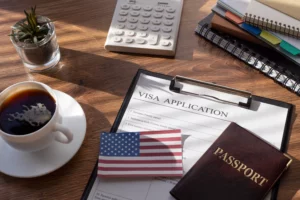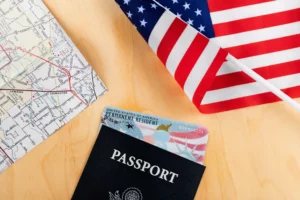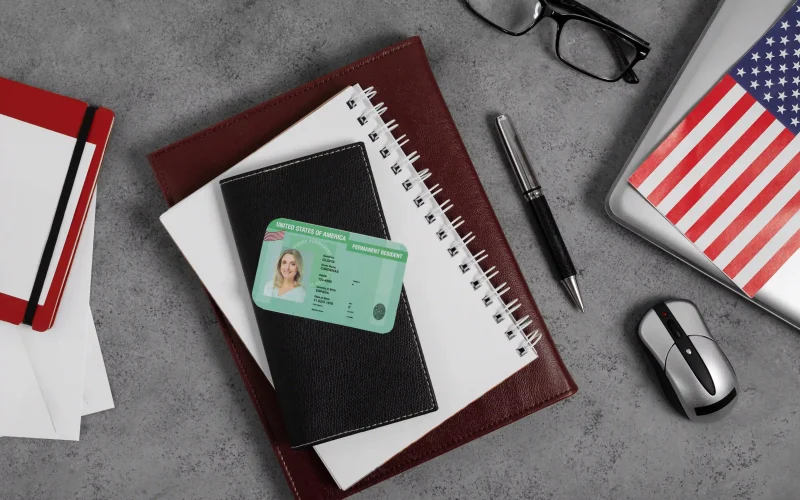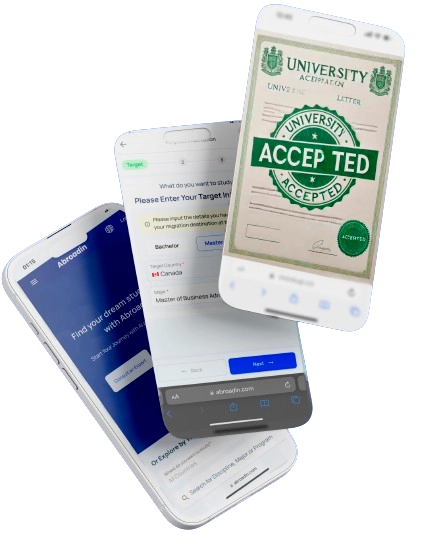

For many immigrants, the dream of becoming a US citizen represents a chance to solidify their place in America. But what exactly is naturalization, and what are the steps to take this transformative step? This Abroadin article explores all you need to know about US passports for permanent residents and US citizenship requirements and application process.
In this guide:
- What is Naturalization?
- What are the Advantages of US Passports for Permanent Residents?
- What are the US Citizenship Requirements?
- What is the US Citizenship Application Process?
- How to Renew US Passports for Permanent Residents?
- Tips for Getting US Passports for Permanent Residents
- Conclusion
What is Naturalization?
Naturalization is when someone who wasn’t born in the United States becomes a US citizen. Only certain immigrants can do this process, those who have a green card; which means they’re permanent residents. They can apply for 3 to 5 years or meet specific military service requirements.
If you have a green card, you can apply for citizenship after being a five-year resident. It is the most common way people become US citizens.
To qualify, you need to have lived in the US continuously for five years before you apply using Form N-400, Application for Naturalization. The Immigration and Nationality Act (Title III, Chapter 2) explains all the requirements for someone who’s been a permanent resident.
It takes about nine months from applying for citizenship to becoming a citizen at the Oath of Allegiance ceremony. Let’s talk about the advantages of US passports for permanent residents in the next section.
What are the Advantages of US Passports for Permanent Residents?
Citizenship means being born to US citizens or completing the naturalization process. This status brings new opportunities and responsibilities for the people who can successfully achieve it.
As a citizen, you get a US passport, allowing visa-free travel to many countries and access to assistance from US embassies or consulates in emergencies. You also have the freedom to travel without restrictions, but it’s wise to check visa requirements beforehand.
- Voting rights: With citizenship, you can vote in national elections.
- Running for office: You can run for government positions as a citizen.
- No more immigration paperwork: Once you’re a citizen, you don’t need to deal with immigration forms anymore—there are also no more fees, renewals, or reporting to the government when you move.
- Better job prospects: Only citizens can work for the US government, which usually means higher pay and benefits.
- Access to government programs: As a citizen, you can access federal assistance programs like Social Security and Medicare and apply for federal college aid.
- Protection from deportation: Once you’re a citizen, you can’t be deported unless there’s fraud involved in your application.
- Sponsoring family members: You can help family members get permanent residence in the US.
- Automatic citizenship for children: Your kids become citizens automatically, even if born outside the US. Just inform the nearest US embassy or consulate.
if you want to know about Student Life in USA | ALL Challenges and Opportunities read this article:
What are the US Citizenship Requirements?
Before you apply for naturalization, you must meet specific eligibility requirements. Depending on your situation, different requirements may apply to you. These are the basic US citizenship requirements you should meet:
- You must be at least 18 years old when you apply using Form N-400, Application for Naturalization.
- You must prove that you’ve been a legal permanent resident in the US for at least five years.
- You must have lived continuously in the US for five years right before you apply using Form N-400.
- Before applying, you must have been physically present in the US for at least 30 months out of those five years.
- You must have lived in a state or USCIS district for at least three months before applying.
- You must show good moral character for at least five years before applying.
- You must commit to the ideals of the US Constitution.
- You should be able to understand basic English, read, write, and speak it.
- You should know about US history, government principles, and civics.
- You have to take an Oath of Allegiance to the US.
Depending on their age and how long they’ve been a legal permanent resident, some people don’t need to take the English test for citizenship. They can take the civics test in their preferred language.
Check the accommodations page or the USCIS Policy Manual Citizenship and Naturalization Guidance for more details.

What is the US Citizenship Application Process?
If you’re applying for US passports for permanent residents for the first time in the United States, follow these steps:
Step 1: Fill out Form DS-11
Start the US citizenship application process by completing Form DS-11: Application for a US Passport. You can download and print this form or fill it out online.
Step 2: Show Proof of US Citizenship
You need to provide evidence of your US citizenship. If you’ve recently become a citizen through naturalization, you can use your Certificate of Naturalization. If you don’t have this certificate, you can use other documents.
Check the State Department’s Citizenship Evidence for examples and tips on gathering your documents in the US citizenship application process.
Step 3: Bring a Valid ID
You must also bring a valid form of identification and a photocopy of both sides (if the information is printed on the back). Commonly accepted IDs include:
- a state-issued driver’s license, or
- a current foreign passport.
Step 4: Get a Passport Photo
Your application must include a passport photo measuring 2 x 2 inches (51 x 51 mm). Make sure the photo meets the requirements outlined here.
Step 5: Submit Your Application
You must apply for your first passport in person at a passport acceptance facility. The US State Department authorizes these facilities, which can be found in places like state government offices, public libraries, and post offices. You can locate the nearest facility here.
Once you know where to go, submit your completed Form DS-11, citizenship evidence, ID photocopy, passport photo, and necessary fees. After submitting your application, you can track its status online.
Applying for a Passport from Outside the US.
Getting a US passports for permanent residents outside the country works differently than applying from within the country. If you’re a US citizen living abroad, you’ll usually need to apply for your passport in person at a US Embassy or consulate.
Each embassy or consulate has its own rules and processes for passport services. People living abroad can find more info on their country’s embassy or consulate website.
The standard processing time for a passport application is currently 8 to 11 weeks. But if you have international travel plans coming up soon or need the passport faster, you can apply for an expedited passport by paying an extra $60 fee.
Expedited passports take 5 to 7 weeks to process, starting when the government gets your application at a passport agency or center.

How to Renew US Passports for Permanent Residents?
US passports for adults usually last 10 years, while passports for kids under 16 are good for 5 years. Know when your passport expires and learn about the renewal process before it’s time to update it.
While the steps might change depending on your situation, here’s the usual process for renewing your passport by mail at your nearest United States Post Office:
Step 1: Fill out the Renewal Application
Start by completing Form DS-82: US Passport Renewal Application for Eligible Individuals. You can either do this on paper at the post office or online.
Step 2: Include Necessary Documents
Along with Form DS-82, you’ll need to send in:
- Your most recent US passport book and card.
- A passport photo that meets the requirements.
- Certified copies of documents if your name has changed since your last passport.
Step 3: Pay Fees and Mail Your Application
You’ll need to pay the renewal fees with a personal check or money order, as online payments aren’t accepted for passport services. Include the check or money order when you mail your completed application and the documents mentioned earlier.
To determine your renewal fees and where to send your application, check out the State Department’s renewal info page.
if you want to know more about Why Study in the USA | 7 Reasons to Pack Your Bags Today! read this article:
Tips for Getting US Passports for Permanent Residents
Before you start the journey to becoming a US citizen, it’s crucial to understand the primary responsibilities that come with it. Here are some essential things to know:
Renouncing Other Citizenship
You might have to give up citizenship in other countries. Depending on your home country’s rules regarding dual citizenship (being a citizen of two countries at once), you might need to relinquish your citizenship when you become American.
The US allows dual citizenship, but you’ll typically need to use your US passport for travel in and out of the country. Some countries, like Australia, Canada, and the UK, also allow dual citizenship. However, others, like India and Japan, may require you to give up their citizenship once you become American.
It’s wise to check your home country’s policy on dual nationality before applying for naturalization if you plan to keep your citizenship there.
Military Service
Although the draft for mandatory military service ended in 1973, it could be reinstated. If it does happen, as a US citizen or green card holder aged 18 to 25 who has lived in the US, you must register with the Selective Service System.
Jury Duty
In the US, serving on a jury when called is mandatory. You must attend if you receive a summons, although you might not ultimately serve. Only those chosen by the judge and attorneys after being summoned will serve on the jury.
Exemptions from Federal Jury Duty
Active-duty military personnel, professional firefighters and police officers, and some full-time public government officials are usually exempt from federal jury duty.
Individuals who served on a federal jury in the past two years, those aged 71 and older, and volunteer first responders may request excused, but policies vary by district court.
State and local courts have exemption rules based on age, disability, or public office positions.
Lifetime US Income Tax Filing Requirement
US citizens are required to file US income tax returns for life, regardless of where they reside.
If you live abroad, you can exclude a portion of your income—currently over $100,000—from taxation if you meet specific requirements. Any income above this limit is usually subject to taxation.
Scrutiny of Criminal History
Your criminal record will undergo a thorough examination during the naturalization process.
If you’ve committed a crime that could lead to deportation, such as immigration fraud, drug offenses, or domestic violence, it’s crucial to seek legal advice before applying for citizenship.
Conclusion
Becoming a US citizen unlocks a path to more significant opportunities and civic engagement. From voting rights and unrestricted travel to federal benefits and job prospects, naturalization offers a complete chance to integrate into American life. However, this privilege comes with responsibilities like taxes and potential military service. If you have any question regarding US passports for permanent residents, please leave a comment below.
Sources:
https://www.boundless.com/immigration-resources/how-to-apply-us-passport/
https://www.boundless.com/immigration-resources/naturalization-explained/
https://citizenpath.com/citizenship-requirements-5-year-permanent-resident/


How useful was this post?
Click on a star to rate it!
Average rating 0 / 5. Vote count: 0
No votes so far! Be the first to rate this post.







No comment yet, add your voice below!